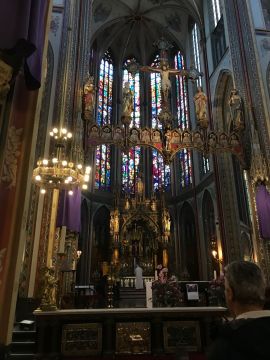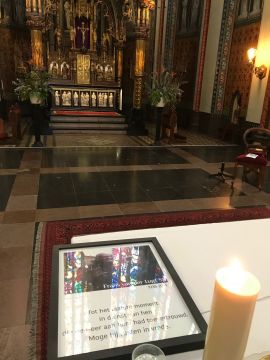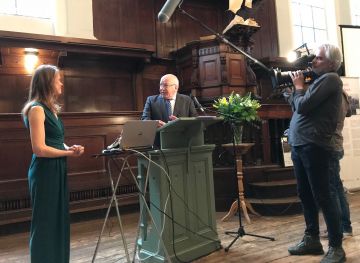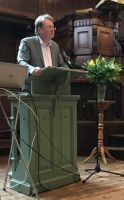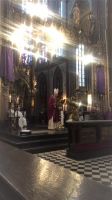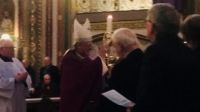Pater Frans van der Lugt herdacht
Vermoord in Homs (2014)
In Amsterdam is op zaterdag 6 april herdacht dat vijf jaar geleden pater Frans van der Lugt werd vermoord in het Jezuïetenhuis in Homs. Hij bleef in de stad, bij zijn mensen, ondanks de oorlogssituatie, wetend van het gevaar. Zij leven was gewijd aan het bij elkaar brengen van mensen en tot eenheid brengen en er zijn voor de zwaksten in de samenleving.
Kruispunt
Zondagavond is de Kruispunt uitzending op de televisie aan pater Frans gewijd (23.10 uur).
Deze zaterdag was er - na een lunchconcert - een herdenkingsbijeenkomst in de naast de Krijtberg - de kerk van de Jezuïeten - gelegen Doopsgezinde kerk, die werd geleid door pater Jan Stuyt s.j.
De herdenking
Provinciaal Johan Verschueren opende de bijeenkomst met een groet waarna een boodschap werd voorgelezen van de generale overste, die op dat moment in Homs was voor de herdenking. Cilia van der Horst presenteerde haar nieuwe boek ‘Wie ben jij, o Liefde’ met uit het Arabisch vertaalde teksten van pater Frans van der Lugt en Jan de Volder (foto onder) vertelde over de humane corridors, die door Sant’ Egidio zijn opgezet om vluchtelingen een goed en veilig heenkomen te bieden. In Essen in Duitsland is een huis naar pater Frans genoemd waar vluchtelingen uit verschillende landen samenleven: het Abuna Frans Haus. Pater Lütz Müller vertelde erover. Twee vluchtelingen gaven daarna nog een getuigenis over wat pater Frans en de humane corridors voor hen hadden betekend. Afgesloten werd met een animatiefilmpje over het leven van pater Frans en beelden van de tocht die in 2017 door Nederland is gedaan om pater Frans te gedenken die zelf zulke tochten door Syrie organiseerde, waaraan duizenden jongeren hebben deelgenomen.
Na de herdenkingsplechtigheid volgde de Eucharistieviering in de Krijtberg (H. Franciscus Xaverius) aan het Singel, waarbij ik de volgende homilie heb gehouden.
Homilie
Dear brothers and sisters,
Adultery
They brought Him a woman
caught in adultery.
There she was, in the midst of
dignitaries judging her.
Not a word is said about her male accomplice!
But a sin does not become more grave
if it is exposed.
The sin of those whose sin is not exposed
may be more grave;
its hidden character
might even be a sign
of a heart that refuses to convert and to repent,
while the one whose sin is exposed
is confronted with his or her sinfulness,
and humiliated he is forced to deal with it.
Known as a sinner
This makes clear
that we are not able to judge a person,
because at the end we cannot
judge his or her heart.
The exposure makes the woman known as a sinner
and makes it impossible for her
to wipe out her past
and make a fresh start.
Bridges and roads
Our effort however should be aimed
at welcoming, discerning,
fostering spiritual growth
and integrating in the community,
as our holy Father, pope Francis stresses so often.
We are called not to construct walls
preventing people from entering
our community, our Church,
but to construct roads and bridges
enabling to get on and advance
in following Jesus Christ.
His life
This inclusive attitude is a distinctive characteristic
of the life and person of Father Francis van der Lugt,
whom we commemorate today.
Born in The Hague, his family moved to Amsterdam,
where Frans attended Saint Ignatiuscollege
before entering the Jesuit order.
He studied philosophy, theology and psychology.
Since 1980 he was working in Syria,
either in Homs or in Damascus.
In 2011 the civil war broke out,
changing a lot the whole situation.
Five years ago he was assassinated
and though he was living
in such a terrible war-situation
and though his town of Homs was besieged and bombed
while he himself and many people around him
were suffering a lot from this horrible situation,
he never let hatred conquer his heart;
on the contrary: his faith, peace and love
seemed to become stronger,
while hatred and violence were increasing around him;
the message he left was one
of faith in God’s providence, in His mercy,
and in the goodness of so many good people.
He refused to stop believing in the goodness of man
like he refused to stop believing and trusting
in the goodness of God.
“We cannot let evil
expel the goodness from our hearts”, he said.
No hatred
In this way he showed us
the importance of not letting
hatred and resentment
taking possession of us,
of not giving in to a temptation
to underline divisions among groups and people;
he was rather seeking to foster
what people brings together,
what unites them.
Still familiar
His voice seamed weak and powerless,
but it was at the end broadcasted
in so many countries,
and it is still remembered by millions.
This week I mentioned his name
in a group of people involved in school education
and, to my surprise,
his name was still familiar to each of them.
Power of weakness
There is more power in his weakness
than in the power of violence.
No violence can conquer a heart,
no coercion can bring about
conversion and atonement.
A heart is conquered by steadfast love,
by truthfulness and faithfulness.
The evil and violent power that creates division,
setting people by the ears,
seems strong and overwhelming
and pride and superb contempt of others
seem to be ruling.
But truth is often not
in what is loud and noisy,
not even in what is impressive
and not in the violence of emotions;
truth is recognised
in the silent reflection and prayer
of an indifferent heart,
searching for wisdom, for God.
A world in crisis
I am really grateful
for what the Society of Jesus and others
have done to keep alive
the blessed memory of father Francis,
- Frans van der Lugt -,
since the message of his life
should not be forgotten
and it is of the utmost importance
in “a world in crisis”,
as pope Francis last week called today’s world
in his new Apostolic Exhortation “Christus vivit”.
Much has been said today already
about the life and work of Fr. Francis
and of course I do not want to repeat
what others said
with much more knowledge and eloquence.
But at the other hand this is a unique occasion
for me to recall just a few aspects
of his faith and personality
that I really admire.
Inspiring
For me it is very inspiring
that Father Francis till the very end of his life
did not accept to live
with hatred.
I hope I will always keep in mind his example ,
every time I may feel offended or injured.
Providence
Father Francis
kept a strong faith in Divine providence,
even in the midst
of the grave adversities he was suffering from.
He did not budge.
Open
He dit not want to judge.
He decided to stay open
- with God’s help -
for the goodness in every person,
be he a Muslim or a Christian,
Fruits of his sacrifice
He brought the sacrifice of staying in Homs,
well aware of its possible consequences.
And indeed he died through violence.
This sacrifice was fruitful,
not only because right after his death
finally a solution was found:
His cry for help and food for his people was heard.
But this sacrifice is bearing fruit even today,
since the message of his life and death
keeps inspiring us and many others...
We are about to celebrate the sacrifice
of Jesus Christ.
May we by doing so
while keeping Father Francis’ life and death in our minds -
receive inspiration and strength
to remain and be faithful to our mission.
Amen



















